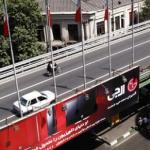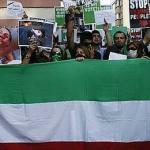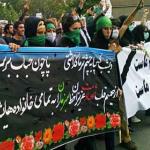IRAN ELECTION CONTROVERSY
Logic in The Numbers of Iranian Votes

With a record turn-out, the incumbent Iranian president Mahmoud Ahmedinejad has been re-elected with sixty-three percent of the vote giving him an absolute majority. The landslide victory left the opposition baffled after a successful campaign by the reformist candidate Mir Hossein Mousavi. Within hours of the polling stations closing, the Supreme leader Ayatollah AliKhamenei immediately called on Iranians to get behind the Iranian president and "to avoid provocative behaviour."
As the results came in, Mousavi issued a statement with accusations of vote rigging and irregularities in the count. Tehran's streets were then flooded with his supporters and clashes with the police followed. The international media have described it as the worst social unrest in a decade, so what can we take from all of this?
Mousavi charges of fraud
Mousavi's claims will be taken up in a legal manner, but whether it can legitimize the allegations remains to be seen. Text messaging - one of the most popular ways for opposition supporters to communicate - have been suspended along with pro-Mousavi websites and leading opposition figures have been arrested.
Whether the claims are true no one can really say, but the fact that Mousavi lost in his heartland is indeed mystifying. Mousavi, an ethnic Azeri lost his home-city of Tabirz to the incumbent who reportedly won with 57% of the vote. The numbers in Tehran are similarly perplexing where Mousavi clearly had a majority support, but as the numbers came in from the polling stations they stood steady in favour of Ahmedijad with no fluctuations whatsoever.
Another odd calculation that critics of the government have pointed to is the rapid pace at which the counting was done. According to past elections Iranians were expecting the results by lunchtime Saturday, however, most learned who had won as they woke up on Saturday morning.
Iran's global and regional import
What does this mean for Iran and for the region? Does it demonstrate a more united Iranian nation because ethnicity didn't factor into the voting this year. Hard to say, but the results do show a resilient Iranian public to external pressure. Ahmedinejad, is seen as a humble figure in Iran, a respectable and devout man who is against any kind of manipulation by the West. This garners him extremely popular support among conservatives and rural Iranians. He also has the backing of the clerical hierarchy, state media, security forces and a large percentage of the public. So it's difficult to see what Mousavi can really do now.
The US have taken an extremely subtle approach to the election results. Hillary Clinton, US secretary of state, simply stating, "We hope that outcome reflects the genuine will of the Iranian people."
How Washington will push ahead with its planned dialogue with Iran is equally just as perplexing. Obama has continuously made warm overtures towards Tehran since taking office, and the re-election of Ahmedinejad may leave the White House in an embarrassing position, if Tehran doesn't take up the offer of direct engagement.
Will this bring more tensions between Israel and Iran, and prolong the volatility of a region that desperately needs to find some stability, no one can tell.
Amedinejad softenes tone
Ahmedinejad's acceptance speech was somewhat subdued in tone when compared with his past remarks. Some observers say that this was because of the unrest occurring a few kilometres from where he was sitting, and that we may see a more hard line approach in the days and weeks to follow. But the rhetoric has softened. Speaking at a press conference on Sunday in the Iranian capital, Ahmedinejad said: "The world is moving towards conversation and dialogue," But he also said that Iran would defend itself in the face of aggression, adding that the nuclear issue is in the past.
One thing that is clear, the majority of the international media failed to truly understand what was happening in Iran with regards to Mousavi's campaign. Most looked towards the green movement as an orange type revolution that would usher in a new regime. To think this is to totally misunderstand Iran. Mousavi was not challenging the religious regime, he was however offering a different style of governance seen by the fact that his wife stood next to him at almost every campaign rally in the led up to the vote. Many voters felt it would have been a political evolution of the Islamic revolution not a move away from it.
Foreign policy is a constitutional issue. Anti-imperialism is a constitutional demand. To challenge the religious regime is to challenge the constitution, Mousavi was not challenging this. In fact he made a direct reference to the Qoran in his letter issued against the vote counting.
"Why not trust in God, who has shown us our ways. We are patient in the face of what disturbs us. Our resilience is in god," says Mir Hossein Mousavi.
The supreme leader may also have mistaken Mousavi's campaign for a revolution aimed at disposing the current regime, which may actually backfire on the Islamic republic itself, should the protests continue.
The power structure in Iran dictates that regardless of who won the elections the president's hands are tied to a certain extent in some areas of governance. Ahmedinejad demonstrated this when asked a question over capital punishment by the Lebanese-based British journalist Robert Fisk of the Independent newspaper at the Sunday press conference when he said: "I'm against executions and the killing of people, the judiciary is independent."
A historic moment
The elections did provide a historic moment for Iran, the turn-out reached a new record high of eighty-five percent. The results however, also provide a historical development - an Iran that wasn't divided along ethnic lines, or did it? The numbers just somehow don't add up - the last time turn out reached eighty percent, the reformist camp won. That was the year Khatami became president. Ahmedinejad won his first-term with only 60 percent turn out. This is the critical number, which is why many Iranians and observers are stunned by the announcement of Ahmedinejad's win. Mousavi's campaign mobilized otherwise apathetic voters and deserved a legitimate election process.
Iran's tenth presidential election will be scrutinised around the world, as Ahmedinejad gets back to work for another four years - something the West will just have to get used to. (AM/EK)







